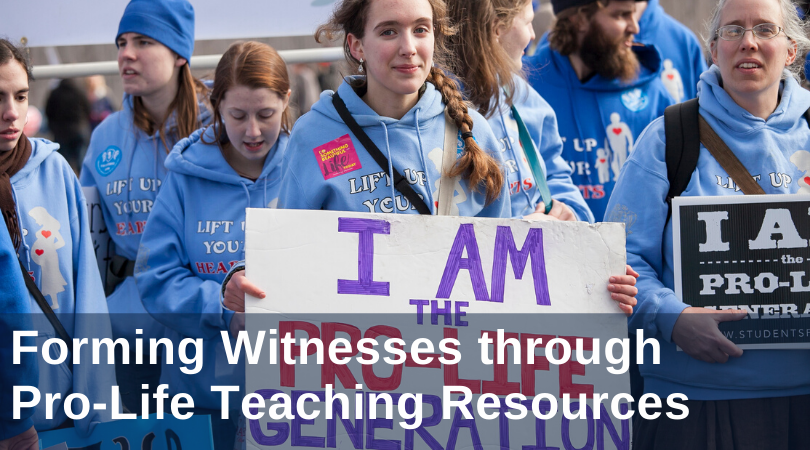
When I first started brainstorming how to teach the topic of human dignity to my eleventh-grade Morality class, I was eager but intimidated. Covering the topic of abortion was a must, but when I sat down to think about how I could cover the topic in a nuanced and compassionate, yet firmly pro-life manner, I was stumped. Many questions flooded my mind: ‘How do I take a firmly pro-life stance, while also expressing compassion for women who have suffered abortions?’ ‘How do I present the pro-life standpoint in a way that is transformative but not preachy?’ ‘How do I help my students see that all people have a right to life, even when that life involves suffering?’
With these questions running circles in my head, I stumbled upon the Office of Life and Human Dignity’s “Teaching Human Dignity” coursework. As I read through the material, I realized the lessons on Disability Selective Abortion, though intended for high school history classes, could be easily adapted for my theology class.
As I adapted the lesson plans to fit the needs of my own classroom, I was struck by the genius of the unit’s focus and structure. The unit begins by defining and exploring historical atrocities: “large-scale, long-term, historic occurrences systematically perpetrated by individuals in a powerful group against individuals in a marginalized one.” The material then moves into a discussion of a strikingly prevalent phenomenon, Disability Selective Abortion (DSA), which refers to the widespread practice of aborting unborn children who are positively diagnosed with Down Syndrome through prenatal testing. In the United States, 67% of unborn children who test positive for Down Syndrome are aborted, while in Iceland this number has reached 100%. By exploring this specific and widespread type of abortion, I hoped to open my students’ eyes to the injustice of abortion of any kind.
As a class, my students and I viewed CBS News segments that covered the prevalence of DSA in Iceland and then engaged in fruitful discussion on the topic. Together, we discussed how societal values shape the acceptance of DSA and why DSA is considered to be a societal “good.” It was amazing to see my students recognize how modern society’s idolization of productivity and fear of suffering leads to a devaluing of those who suffer and “fail” to meet societal standards of productivity due to a disability. As the students began to discover the injustice of DSA and the false assessments of human worth that contribute to DSA’s acceptance, we began to explore another side of the DSA narrative.
Through the excellent videos produced by the Jérôme Lejeune Foundation, my students and I were welcomed into a new narrative in which those with Down Syndrome speak for themselves and proclaim the beauty and value of their lives. By actively engaging the stories of those who live with Down Syndrome, we saw that those with Down Syndrome live full lives in which they struggle heroically, achieve greatly, work creatively, enjoy fearlessly, and love fiercely. As a class, we acknowledged that people with Down Syndrome suffer, but who in life is completely free from suffering? Who are we to say that their particular suffering is unacceptable, while mine is acceptable?
These videos were profoundly moving for one student in particular. As the last video finished, I noticed this student had tears in her eyes. She was eager to share her impressions of the videos. She explained that her brother has a developmental disability, and that she has spent a significant amount of time volunteering to work with people with disabilities. She witnessed to the beauty of her brother and of those with whom she works. She spoke of their love and their joy. Her witness uncovered the humanity and dignity of those who are regularly discarded—those whom others deem “unproductive” or doomed to a life of suffering. Her authenticity and genuine love for her brother and those she had served spoke louder than any set of statistics or speech on the evils of abortion ever could.
I am immensely grateful to the McGrath Institute's Office of Life and Human Dignity for sharing their carefully cultivated resources with teachers who desire to form the minds and touch the hearts of their students. In Evangelii Nuntiandi, Pope Paul VI wrote, “Modern man listens more willingly to witnesses than to teachers, and if he does listen to teachers, it is because they are witnesses” (§41). I am grateful that these resources allowed me to step aside and make room for my student to witness to the dignity of all human life, and so become a teacher to us all.
For access to our Office of Life & Human Dignity's full resource library, visit our website:
Featured image: American Life League via flickr; CC-BY-NC-2.0.



